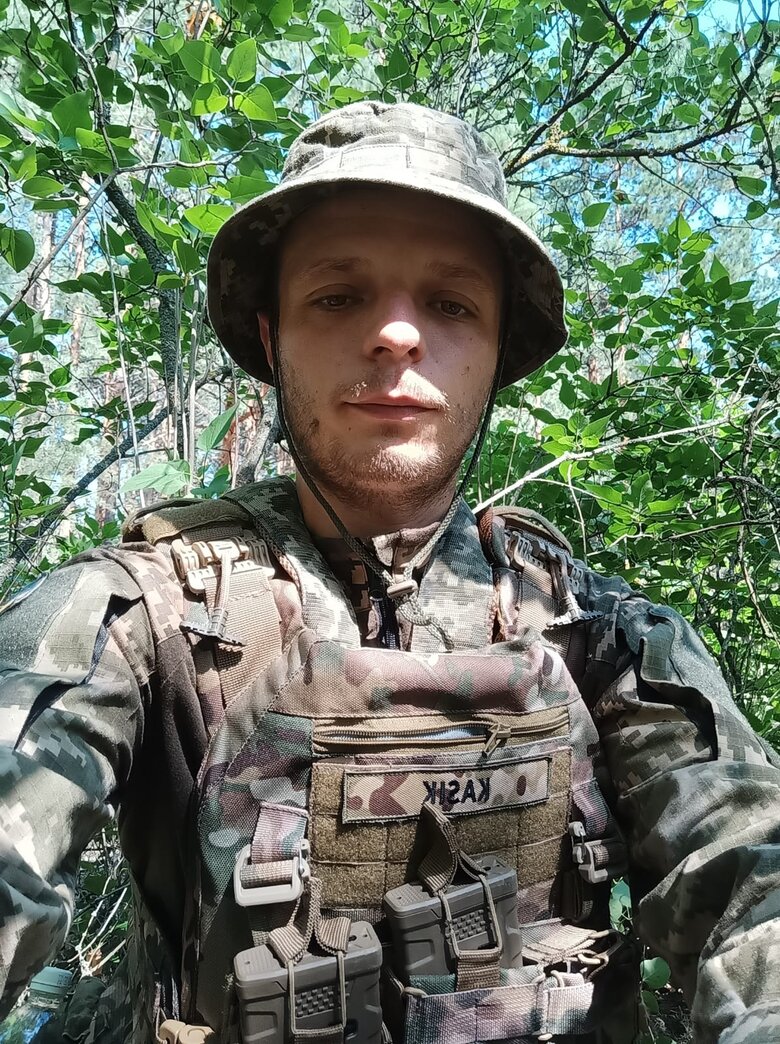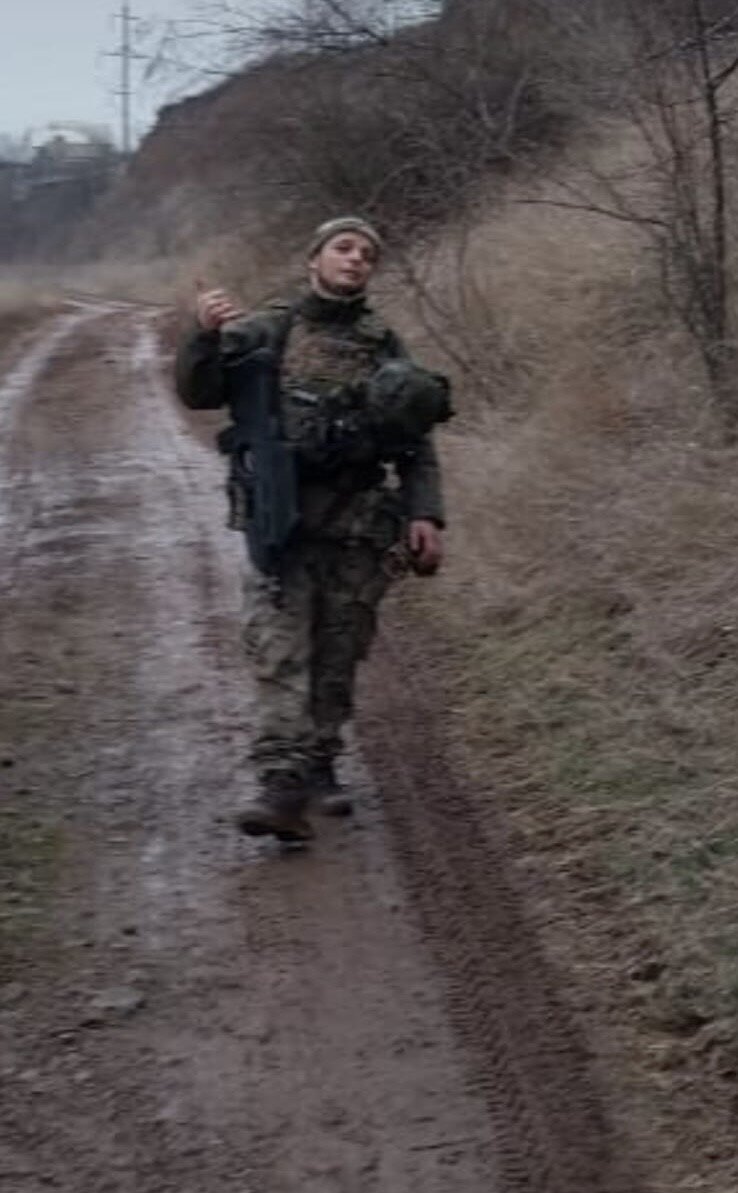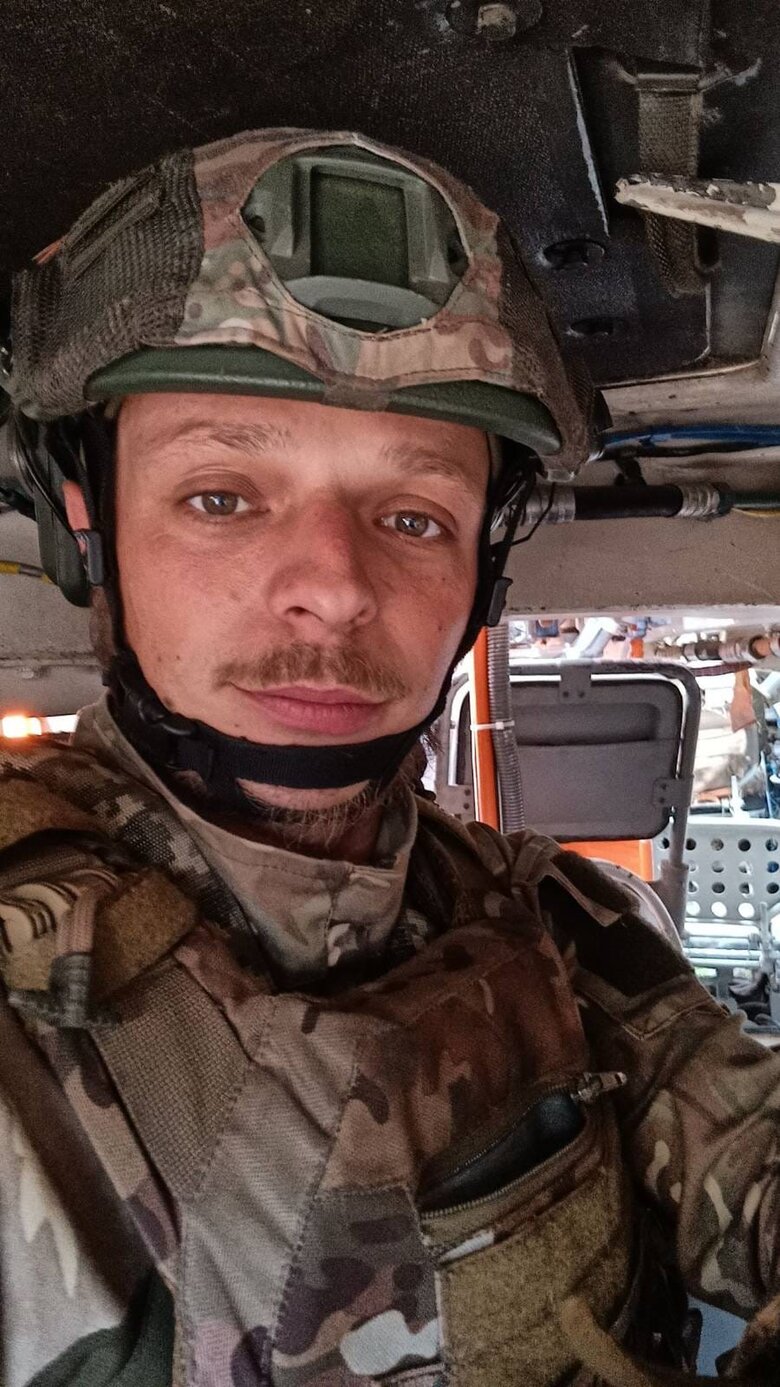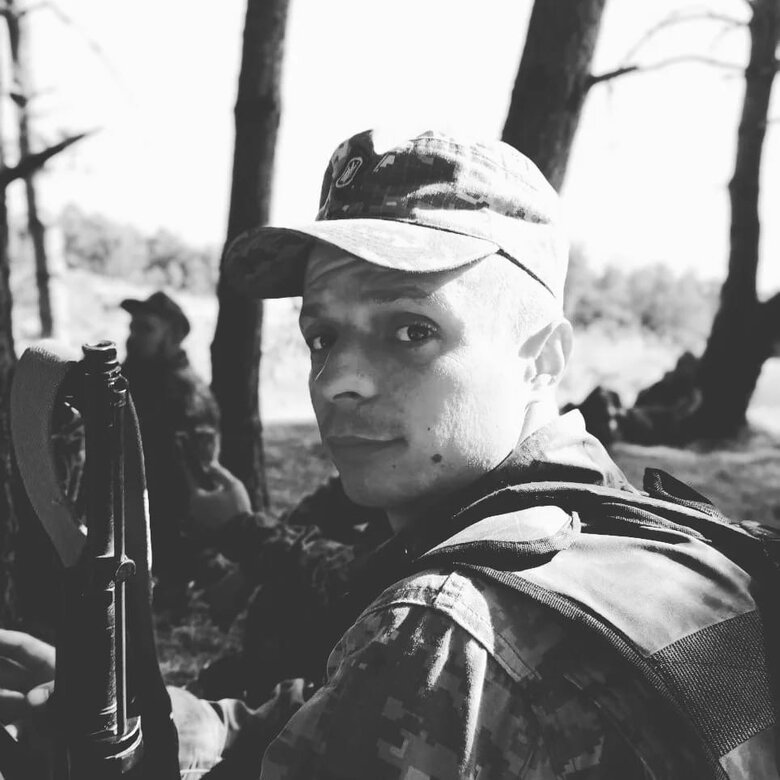Call sign Kasik: "Many watched news and thought, ’I don’t want to go to war.’ But who among us did?! Still, someone has to!"
He held off the enemy for ten days from a dugout, alongside two wounded comrades. Armed only with Kalashnikov rifles and grenades. Fortunately, the Russians eventually retreated, and the fighters were evacuated. Oles, call sign Kasik, is a reconnaissance soldier. He now serves as the platoon’s senior sergeant in the reconnaissance battalion of the 5th Separate Assault Brigade (SAB).
He is originally from the Vinnytsia region. Before Russia’s invasion of Ukraine, he worked in civilian life as a farmer and in construction.
- Were you preparing for a full-scale war? Did you realize it was a possibility?
- When you live in a village and tend to your household, you don’t really pay much attention to the news. I wasn’t particularly following it. For some reason, I thought such an invasion was simply impossible. So when it happened, it caught me completely off guard. Honestly, it was hard to believe.
- Can you recall what February 24, 2022, was like for you?
- Since I live in central Ukraine, I didn’t see anything unusual at first. There were no strikes here in the early days of the full-scale war. Not even in the first few months. But once I found out from the news what was happening, I was shocked. My relatives in Kyiv also told me what it was like there. And those who were in Donbas evacuated to the West.
- So you found out from the news and your relatives that a full-scale war had begun. What did you do?
- We started organizing, setting up checkpoints, taking shifts, and keeping things under control. Since we live closer to Transnistria, we thought something might happen from that direction too. My father-in-law and younger brother joined the military. My family tried to talk me out of it, considering that two of our own were already fighting. But I still decided to enlist.
- When was that?
- I went to the enlistment office back in 2022. I was 28 at the time. I hadn’t served before and wasn’t even registered for military service. So they didn’t take me right away. On top of that, there was some confusion. That was when the administrative districts were being restructured and expanded. My documents got lost during the move, so I had to get new ones. That’s why I was mobilized only at the beginning of the following year.
- Where were you first sent for training?
- To Starychi in Lviv region. Back then, I just wanted to learn as quickly as possible, to get at least the basic skills. The guys were already fighting, and I wasn’t?! I’d already missed nearly a year.
- Did you feel guilty about that?
- I did. I mean, how could my younger brother go before me?! He was actually working in Poland before the full-scale war and came back when it all started. They took him right away because he had served before. He was sent to Donbas. Now he’s on the Pokrovsk front.
- Was the training difficult?
- I wouldn’t say so. I’m used to physical labor, so it felt fine to me. The only hard part at first was getting used to marching, moving in formation, doing everything on schedule, and not being able to go anywhere.
- How long were you there? Two months?
- I spent a month in basic training, then another 35 days training to become a reconnaissance soldier.
- Where were you sent after that?
- To the capital. That’s when I joined the 5th Assault Brigade.
- How did you choose the unit?
- I was given options during assignment. They asked, "Want to join recon?" I said, "I do. Especially since I trained as a reconnaissance soldier."
- By the time you joined, the 5th Assault Brigade was already deployed in Donbas…
- I was assigned to the 4th Battalion, which was still being formed at the time. While they were gathering personnel, we spent about two months near Kyiv. Then we were deployed to Donbas.
- At that point, you hadn’t seen combat yet. And suddenly you’re on the front line — and on a tough one. What were your first impressions?
- At first, things weren’t entirely clear, because everything had to be done fast. But once you start going out on missions, that’s when you begin to understand what’s really going on.
– Do you remember the first one?
– We were in the Bakhmut sector, moving in between Bakhmut and Klishchiivka. They drove us in on an M113, then we hiked six kilometres to the position. It was autumn, rain, mud. It was very interesting (smiles – O.M.). But you know, there were fewer of those damn things flying around back then (drones – O.M.), so it was easier than it is now. I thought it was hard then, but now it’s definitely worse.
- Did you make contact with the enemy that time?
- No. Four of us set out, but only two reached the position — the others fell behind. We took up the position and sat there for five days. We saw the enemy. The Russians came within about sixty metres. I was told not to shoot, but a buddy on the second OP opened fire, and they pulled back. They didn’t push hard — just showed they were nearby, that’s all.
Two weeks after that mission we ran into them almost in the same spot — only from the other side of the field. We had just been assigned positions and were to hold the defence. They tried to storm us. A VOG grenade landed, and I was wounded. I stayed there another two days before they relieved me.
- What kind of wound did you sustain?
- My cheek was torn open. They sent me for treatment for about twenty days. I spent almost until New Year’s in hospital, then went back to the front.
- The situation there was different by then, wasn’t it?
- It was, and it kept changing. By summer near Klishchiivka there were already a lot of drones. On my first sortie. I could walk more or less calmly, even have a smoke. We moved in groups of ten to twelve. Yes, there were hits, but not that intense. Now a drone just spots you—and that’s it.
- How would you characterise the enemy? What were they like at that time?
- Big Russians were assaulting us, not weaklings. Remember how they were being called "chmonias" ("Chmonia" is a derogatory slang term used in Ukraine to describe poorly trained, unkempt, and demoralized Russian soldiers, often sent to the front lines with minimal preparation or equipment - ed.note) back then? Well, that isn’t quite accurate. Sure, there were some like that, but for the most part they were regular soldiers—trained and prepared. Don’t forget: Russia is a country that is constantly at war.
- Plenty of Wagner fighters were operating in Bakhmut. Did you fight them?
- No. By the time I was there, they weren’t present in such numbers as at the start.
- A soldier with the callsign Patriarch, who also served on the Bakhmut front, told me in an interview a year ago while analyzing the enemy: "The Russians come here with a sense of immortality. Like, they’ll win quickly, get a bunch of medals, and everything will be great." What’s your take on that? Are they pushing forward without fear?
- It seems so. Indeed, they often behaved exactly as you said, acting like they considered themselves immortal. Maybe it’s because there were so many of them. Those who had been fighting for several years just charged straight ahead — didn’t care at all. Although there were also some who surrendered.
- Have you taken prisoners?
- Yes. Almost immediately after I returned from my wound. That was my first prisoner.
- What did he say?
- We didn’t really talk much, except when we were escorting him under guard. He said he was 19 years old, from the LPR. I asked him, "When the war started, you were still just a kid. Do you even understand what’s going on? Why did you come here?" He replied, "We were forced. I didn’t shoot." Their standard excuse. I asked, "If you didn’t choose Ukraine, then why didn’t you go to Russia if that’s where you really wanted to be?" He stayed silent. They usually behave like that because they’re afraid to say too much. Their commanders tell them that prisoners here get tortured or killed right away.
- Do they say things about themselves? Do they behave that way toward prisoners? Did this guy surrender to you personally?
- Yes. Our forces tried to storm their group. They got scared and surrendered. They want to live.
- Has the enemy changed during the time you’ve been fighting?
- Yes, they have. They no longer charge in crowds like before. They started moving more like us — the smaller the group, the less noticeable they are. They don’t come in groups of five anymore. One goes first, then another follows after some time.
- What do they use for transport?
- Motorcycles, quad bikes, buggies, regular cars, IFVs, and "Bukhankas." Lately, they’ve mostly been using motorcycles, since the rains have started and other vehicles can’t get through easily.
- Is it easier to target them that way?
- Depends. If it’s raining, we don’t really see them either. But under overcast skies it’s a lot easier. Still, all things considered, it’s simpler when they come in on a motorcycle — we can hear where it stops. But if they’re on foot, you might not hear them at all, and it’s harder to locate them. One gets in position and waits for the next one…
- Isn’t it more dangerous to go alone?
- I wouldn’t say so. Personally, it’s actually easier and faster for me to go solo than with a group.
- Because it draws less attention?
- Of course! Even when there’s just one, two, or four of you, it makes a difference. Step on a branch or something like that, and you might give yourself away.
- What’s the situation with their vehicles now? They use them less often, right?
- Right. Like I said, with so many drones around, they’ve gotten more cautious. Sure, they try to transport infantry, but it’s not working like it used to.
- I heard you spent ten days on a position, holding off the enemy. Tell me how that went.
- There were four of us. We didn’t make it all the way to the position — we stopped about a kilometre and a half short because two of our guys took serious leg wounds and couldn’t walk. We stayed in cover for ten days. The Russians didn’t expect us to be there — they were supposed to push forward. Their recon showed the area was clear. So they planned to go around. But there we were.
- What weapons did you have with you? How did you fight back?
- We only had Kalashnikovs and grenades.
- But ten days…
- Look, when you get into a dugout, you can usually find weapons and ammo there too. It’s never completely empty.
- Were you scared?
- Not really. I was already used to it (smiles. – O.M.). But it was harder for the guys — it was their first sortie. And with two of them wounded, they were worried no one would come to evacuate them. But there simply was no way to do it during those days. Twice they tried to reach us, but we waved them off because the enemy would’ve immediately targeted the driver. So we waited.
- How did you eventually get out?
- The Russians pulled back, and they came for us on quad bikes and got us out.
- I take it you were the one in charge of the group. Was it tougher under those conditions?
- The hardest part was giving first aid and trying to save the guys’ limbs. As for coordinating who does what no. Everyone already knows what they have to do.
- What happened to the wounded? Are they okay?
- Yes, they’re fine. Alive, healthy, and in one piece. One of them, who was in worse condition, came by a week ago. His leg hasn’t fully recovered even after six months, but he’s already walking without crutches.
- Have there been moments during the war that surprised you?
- Once there were two big Russians, both nearly two meters tall, walking through the treeline without weapons, just carrying shovels. I guess they’d been sent ahead to dig in if no one was around, and then a group would follow. You could see them from a distance. That was my fourth sortie. I hadn’t seen anything like that before.
By the way, that kind of behavior is common when they’re hoping to get captured and put into the exchange pool.
- But they might end up not in captivity, but under a drone strike.
- That’s exactly what happens now.
- Speaking about the number of enemy personnel, how has it changed recently? Do you think they’re building up their forces?
- In my sector, their numbers have stayed about the same. The only difference, as we discussed, is that they’re using less equipment. They’re drawing conclusions and adjusting their tactics. But judging by their actions, they’re not planning to leave anytime soon.
- We also talked about the increase in drones on the front. Do you fly them?
- I don’t. But we have UAV teams.
- Would you want to switch to those modern combat tools?
- I wouldn’t. By the way, I attended a course on radar systems. The radar detects targets — it illuminates them with a beam. The signal reflects off moving vehicles or people, determining and showing coordinates. I was in Chasiv Yar, sitting in a basement, with an antenna on the roof, spotting the enemy that way.
- So what have you been "tracking" exactly?
- Quite a lot (smiles. – O.M.). Back then, the Russians were assaulting from Bakhmut. Vehicles were moving out. It was raining, so the drones weren’t flying. But the antenna picked up signals and transmitted them. That’s how we knew what was moving and where.
- I want to ask you about the possible ceasefire. Negotiations are happening now (we’re speaking on May 19 – O.M.). Ukrainian and Russian delegations have already met. The U.S. is threatening to pull out of the negotiations if no agreement is reached. What’s your take on all this?
- I don’t pay attention to that. The powers that be will decide something eventually. Maybe they won’t. My mind is focused on something else entirely. Right now, I have guys on the front lines. I’m thinking about getting them back safely. If I did nothing, maybe I’d follow the news more closely. But I’m trying not to watch it at all.
- How long are you prepared to stay on the front?
- I’m not thinking about that yet (smiles. – O.M.). Of course, I want to go home. But as long as there’s work here, I’m not planning anything.
- Many units are currently running recruitment campaigns. Yours included. Are people coming? Any fresh faces?
- Yes. Eight of ours have already completed joint training after the training centers. They’ve met and gotten used to each other. Two have already deployed to positions.
- What do you think about draft dodgers in general?
- Many watch the news and think, "I don’t want to go to war." But who among us did?! Still, it has to be done! I know there are guys on my position who need replacing. And I’m the one going to relieve them.
Of course, everyone’s physical condition and character differ. Not everyone can endure this. Some can’t even handle it psychologically.
- What would you advise those who are afraid? How can they overcome this fear?
- A person has to accept the situation. I was scared the first time too. But everything happens so fast that you don’t really focus or obsess over it. You simply don’t have time! Maybe only when you finish the mission, adrenaline fades. Then you start to weigh things a bit (smiles. – O.M.) — analyze what you did and think how it could have gone better.
- Indeed, even the best-planned operation can go completely differently due to circumstances…
- Absolutely! Especially with so many drones flying around now. Nobody knows how it will turn out. You make agreements, talk it through, take your positions and then everything changes in 20 minutes. You have to decide what to do on the spot. No matter how robotic war becomes, the human factor remains crucial. You have to keep working.
- Do you ever get any leave? Any downtime at all?
- Yes. I did after that battle we talked about. They gave me a leave, so I spent twelve days in Bukovel with my family. And just about two weeks ago I came back from my first annual leave.
- What were your impressions of Bukovel, where it’s quiet?
- I slept a lot there (smiles. – O.M.). We hiked in the mountains. Most of the people there were soldiers like me.
- And did you spend part of your leave at home?
- I did.
- Have people changed?
- They have. It seems to me they’ve gotten used to everything that’s happening. They think the war is somewhere else. Not everyone, of course, but that feeling is there.
- I’m asking because a year ago the serviceman-author Valerii Puzik told me he felt a widening gulf was forming between civilians and the military. Clearly some changes have taken place. How do you react to that? Does it affect you?
- I stay pretty calm about it. The only thing is, I don’t like talking about the war. And you know how it goes—people keep asking, "So how is it over there? Tell us!"
- Do they ask you when the war will end?
- My close family doesn’t.
- What about acquaintances?
- Almost all of them are fighting too. The ones who aren’t are abroad.
- How do you feel about the men who are abroad?
- Honestly, I don’t really care. They left, so they left.
- Should they stay away, then?
- Why? Let them come back. I’ve got nothing to do with them. It was the same before I went to war, and it’s the same now. I don’t keep in touch with people like that, and I don’t plan to.
P.S.: Friends! The 5th Assault Brigade continues to carry out combat missions on the front line every single day. The guys are operating under conditions that demand maximum focus, professionalism, and, of course, drones with reliable connectivity. A fundraiser is currently underway for the "PomstaVolokno" (Vengeance Fiber) project — fiber-optic FPV drones. If you’re able to help, please consider supporting it.
🔗 Link to the jar:
https://send.monobank.ua/jar/6TpPBQhF96
💳Bank card number:
5375-4112-2134-8720
Olha Moskaliuk, Censor.NET
Photos provided by the interviewee





